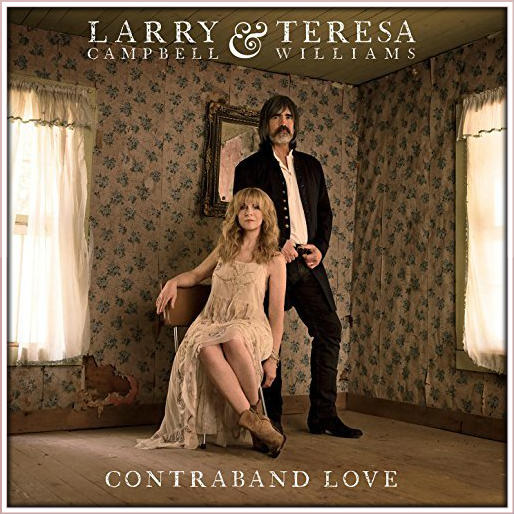Two years ago, longtime companions but independent artists Larry Campbell and Teresa Williams released their eponymous debut record to near-universal acclaim. Both are widely respected veterans of the music industry. Campbell is a veteran of both Bob Dylan's and Levon Helms' touring bands as well as a much sought after studio musician (assisting in projects with Little Feat, Phil Lesh, and Jorma Kaukonen) and producer (David Bromberg Band, Hot Tuna, Richard Shindell). It was his long association with Helm that lit the fire for him to pursue his muse and turn his talents to songwriting and producing for himself. Williams, meanwhile, has contributed vocals to a range of artists including Peter Wolf, Buddy Miller, Elizabeth Mitchell, and Amy Helm.
Campbell and Williams' follow up Contraband Love offers 11 more cuts of prime Americana, great songwriting, and masterful playing but with a darker tone. The album cover photo finds Campbell and Williams posed and poised in a room that has seen better times, its wallpaper torn and faded, the wood floor unswept and dust-covered, the windows covered by dingy curtains that filter the sunlight into sepia-toned gold. It's an apt image to convey the mood of the album's eleven songs outlining promises unkept and love displaced or mishandled, often in the face of addiction and loss.
In "The Other Side of Pain", Williams sings from the perspective of the other woman, the lover in the shadows, denied the full benefits of her heart's investment: "How's it look from the other side where the sun shines / And you can be happy in the light of day?" "Save Me From Myself" finds Williams singing from another damaged perspective, this one the addict who would drag down anyone who loves them, a theme picked up in the title song where Williams sings of holding onto a self-destructive lover, knowing that the potential for breaking any fall is minimal: "But the angels have all begun to cry / They can't help a liar who believes his own lies." Campbell's mandolin combine with Glenn Pascha's mournful accordion and Justin Guip's airy brush strokes on drums to create a sense of lightness before the dark sets in. Campbell himself gives voice to the addict's struggle in "Three Days in a Row", amplifying the sense of how brief success in keeping clean only adds weight to those external forces that would drag the addict back into self-prescribed oblivion.
But all is not darkness or the seduction of oblivion's sweet embrace. The duo's harmonized vocals on Carl Perkins' exquisitely phrased love song "Turn Around" are alight with the spark of their longtime commitment, the instrumentation, which features one of Levon Helm's final performances on drums, loping along in a close-dancing spiral. Campbell's own "When I Stop Loving You" follows to keep the dancers on the floor in a close, slow embrace while he and Williams sing of the sun going out and the stars falling before their love will ever find its end. Meanwhile, the honky-tonk stomp of "It Ain't Gonna Be a Good Night" argues the importance of holding onto each other, come what may.
In all, Campbell and Williams have created another great album of new songs that evoke the old classics of the roadways (and roadhouses) stretching along the Deep South between Nashville and New Orleans and the lesser-known, dustier trails along the way. "Americana" risks becoming a tagline for any group with a banjo and some bib overalls, but when done right and true, like here, one understands that the label is a compendium beyond its parts. The true Americana isn't a sound; it's a feeling. Larry Campbell and Teresa Williams make you feel it with every song.
by Ed Whitelock

